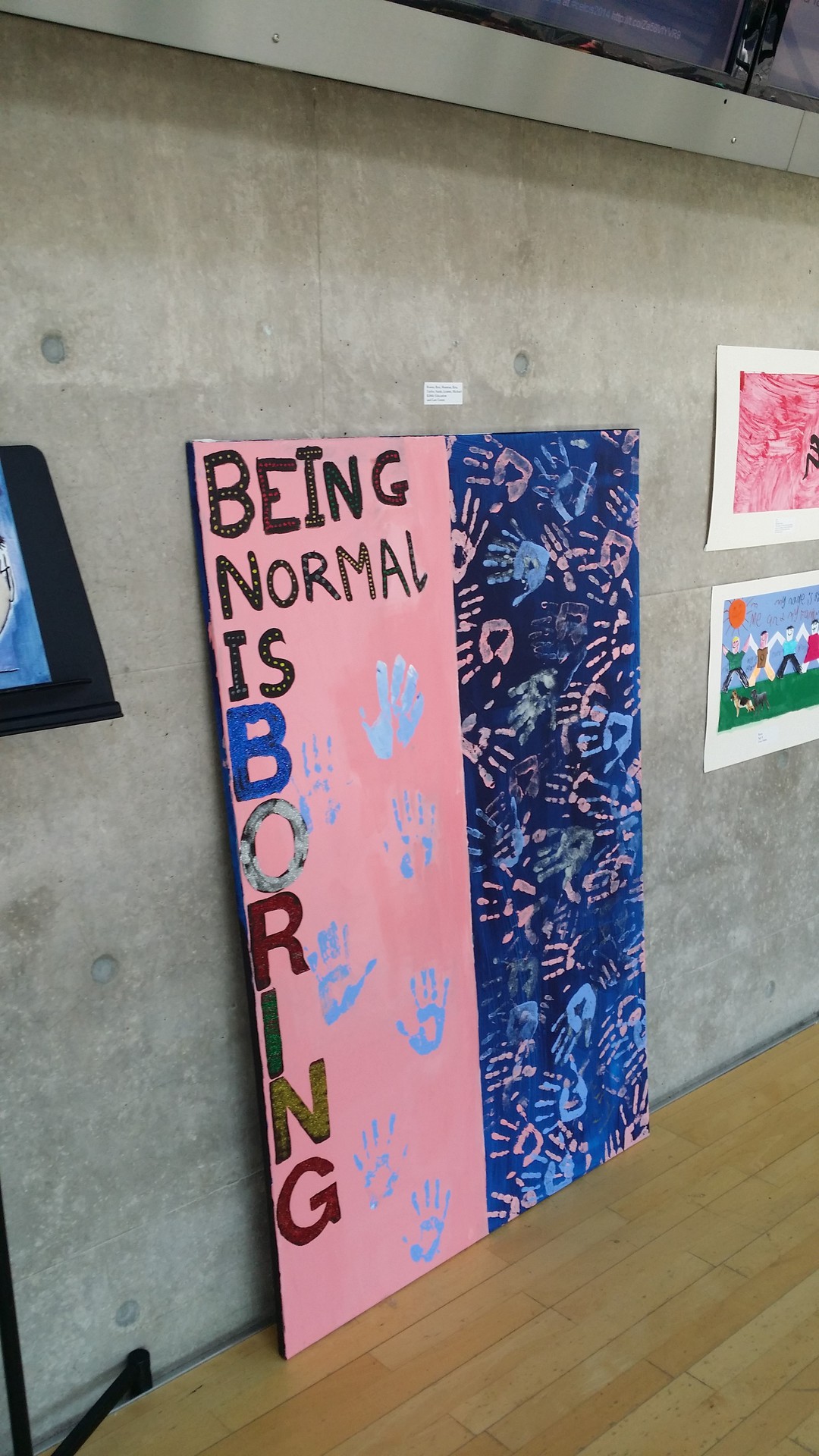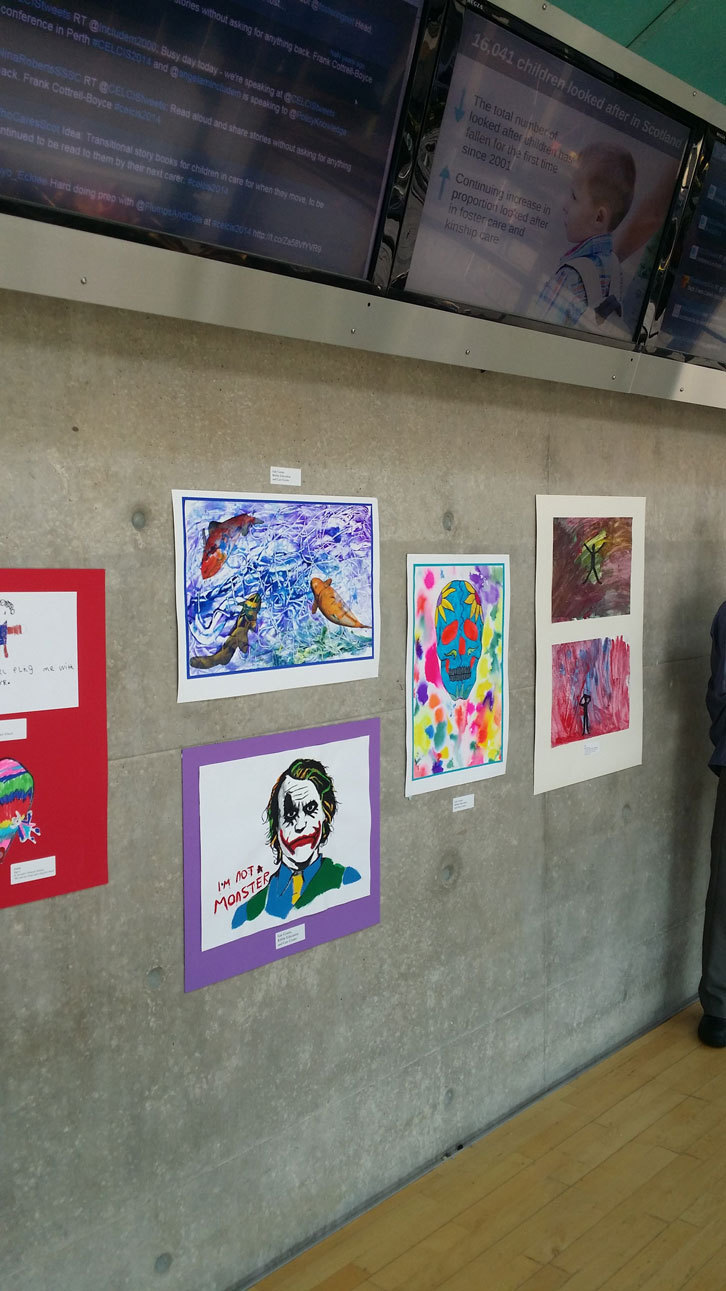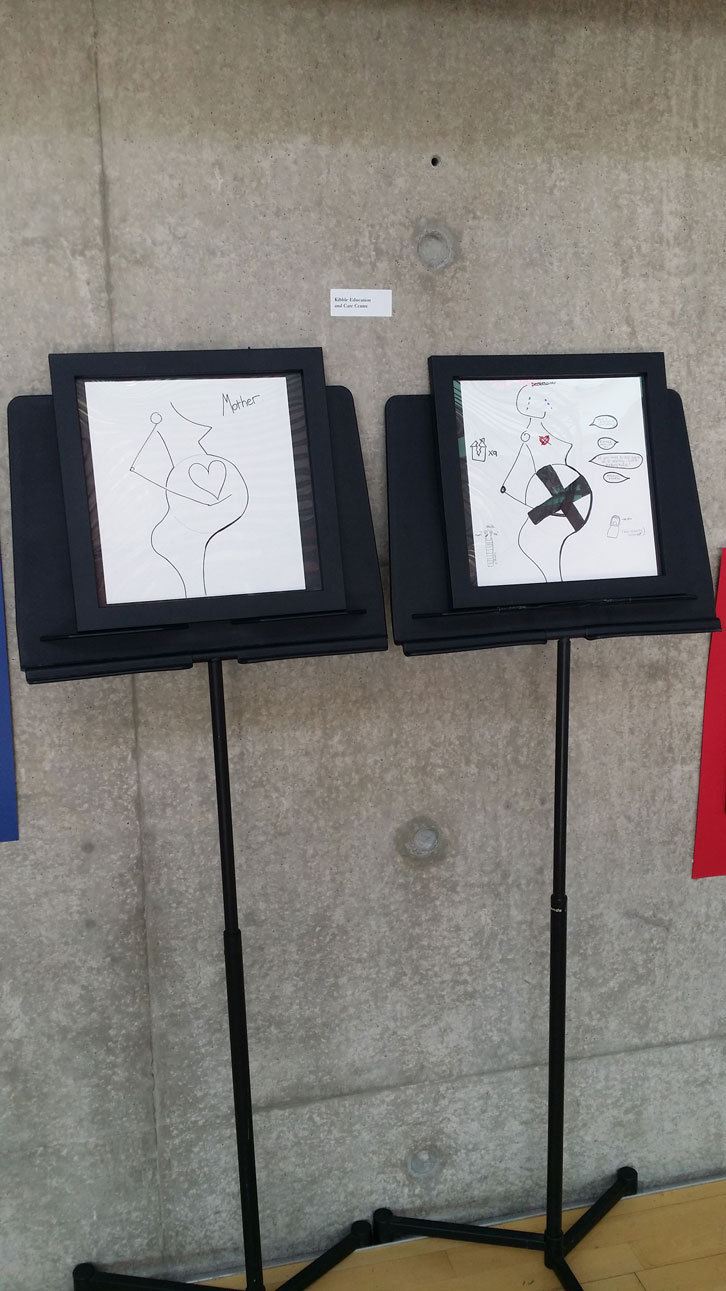Posted: September 5, 2014The following is an article by Gavin Sinclair and was first published in the Scottish Journal of Residential Child Care Vol 13 No 2.
Abstract
In May this year I wrote an article about a theatre play called ‘Please Listen’ and its successes. Today I’d like to tell you about the development of this work, about stability, opportunity, belief, support, communication, continuity, prospects and a young man’s determination to succeed in life. Lots of buzz words used in that sentence, but none without justification. Let me explain.
Jonny
As Please Listen came to a natural end with the core team moving on, we were asked by Who Cares? Scotland to create a new drama, which would complement their corporate parenting training. Jonny, who was part of the original cast, is now 18 years old and has spent the last year studying acting at West College Scotland. He is also employed at Kibble Education and Care Centre on a part-time basis to support the work of the creative arts department. Jonny decided he would write a play about his own life before going into care, his experiences of being in care and the messages he would like to get across about being in care. Jonny did not take long to put together his very own play. Granted, it’s easier to write something that you are already an expert on. I sat with him as he was writing and this in itself was a privilege, seeing how passionate he was about getting the truth on paper and knowing that part of his life would be exposed. I questioned every line as we worked together. ‘Are you sure you want to say that?’ ‘Remember people will see this’. ‘Have a think about how much you want to say’. His response was always the same – ‘I can’t change my childhood or my past, but if this play can help young kids then it is important we get my story out there’. He wrote lines like ‘I was made to sleep in the garden shed’ ‘made to eat dog food’ ‘cold baths’ ‘bruised’ ‘abused’ ‘neglected’ ‘shot’. Even on paper they have quite an impact. Reading those words is hard enough, but when you hear them being spoken on stage by the very lad who endured that time in his life, it has such an impact that it is difficult to describe in words. It was not all about his childhood; in fact that is only a small section. More importantly his words reach out to the audience and attempts to create empathy with looked after children who may be displaying challenging behaviours. The play is called Open Your Eyes because Jonny wants the audience to open their eyes to why kids might be behaving in certain ways and what professionals can do to really make a difference.
The Performances
Since it was created in January 2014, Jonny has presented his play over 40 times and it has had quite an impact. Audiences, largely made up of professionals including care inspectors, teachers, social workers, police, councillors and care staff, have been amazed at his bravery, touched by his story and have walked away from the experience wanting to do more to help looked after children. Here are some quotes from care inspectors who saw Open Your Eyes at their ‘Journey Through Care’ event in May 2014:
Journey through Care play, just really made you aware of the importance of our job and brings back to the front of your mind the lives that some children are living and that they need support with.
The real life experience of the young man from journey through care helped me feel value for what I try to do in regulating care services.
The impact from the presentation from Johnny should be at the fore front of our practice when inspecting, verifying and registering services.
Jonny’s journey through care was a powerful reminder of how we treat children in care, it was emotional and thought provoking.
The play was performed at the Edinburgh City Chambers corporate parent event on the 28th May (also Jonny’s 18th Birthday), and Councillor Catherine Fullerton from Edinburgh City Council had this feedback:
At the recent launch of our newly refreshed Corporate Parenting Action Plan we were moved and challenged by Jonny’s play ‘Open your eyes’. His powerful performance gave us a greater understanding of the adversity some children and young people face before coming into care, reinforcing the importance of our Corporate Parenting responsibilities.
Jonny can now harness the attention of a large group, he can answer questions coherently, he is able to analyse his own experiences and advise professionals on what they can do to make a difference for looked after children. Obviously the experience of Please Listen and Open Your Eyes has helped, but what other factors have influenced Jonny’s life? Why is Jonny so confident to talk about his experiences? Why is Jonny so determined to make a difference for other kids? Why is he able to stand on stage, talk to large groups and be confident enough to know that what he has to say is important?
Jonny’s Care Experience
Missing out some unsuccessful moves when Jonny was young, I’d like to concentrate on the positive influences on the road to this young man’s success. It’s all too easy when we talk about looked after children to focus on the negatives. The poor outcomes in terms of education, the statistics on homelessness, the numbers in prison, mental health, physical health, unemployment, death rates and so on. Now I am not an academic and I haven’t done any formal research on this subject, but I think if we can identify and highlight the achievements of people who have been in care, we might be able to improve outcomes for others.
Jonny found love and stability at Burnside Children’s home in Balloch from the age of 10 and as a day pupil at Kibble Education and Care Centre from the age of 13. Helen Davidson, Jonny’s Keyworker from Burnside, gives the following input:
Jonny arrived at the front door of Burnside with his older brother on 6/6/06. This date became a standing joke with the staff and Jonny (666). The date was relevant due to the chaotic behaviour that Jonny was presenting. It’s safe to say Jonny was a challenge and kept staff on their toes. At first, the boys seemed to feel more secure sharing the same bed and it was clear they took some comfort from this; however, staff were determined to ensure that Jonny gained and developed his own identity. Staff quickly took both boys under their wings and began the long task of trying to build up trust – a lengthy process, especially with Jonny. After some time Jonny began to settle and thrive in the caring environment that staff and the unit had to offer. Jonny became an integral part of the Burnside family and enjoyed many holidays and trips. We all have many fond memories of Jonny and many stories to tell but this cannot be achieved in this short paragraph. I would, however, like to share one story and this was when Jonny appeared at the back door with a duck in a bucket. Jonny asked staff if he could keep this and have it as his pet. Despite Jonny trying to convince staff relentlessly to let him keep it, he proceeded (with his shoulders forward and eyebrows down, looking very disgruntled) to return the poor duck to the stream.
Looking back at the frightened insecure wee boy that Jonny was, compared to the man he is now, I think it’s safe to say that staff have done well and are proud of the man he has become. Jonny has achieved so much despite all the odds being stacked against him; he is a credit to Burnside, its staff and to himself. Staff continue to speak about how difficult and challenging our job is at times; however, when we see what can be achieved with hard work and commitment, that’s when we can say this job is worth it. In a sense, it reminds us why we chose to do it in the first place! I had the pleasure of being Jonny’s key worker for nearly eight years, which is a long time and quite unique. I can only say to Jonny the door will always be open for him and I will miss him.
Kibble
When Jonny started Kibble he had lots of really unusual behaviours, such as making strange noises, talking in riddles, barking like a dog, lashing out in anger and he had little awareness of personal space, to name but a few. It was clear to all that the abuse he had endured as a youngster had affected him greatly. The day services team at Kibble worked with Jonny as did the rest of the education team, to help him grow, mature and develop in his own time. Maggie Mitchell, a classroom support worker who built up a really close relationship with Jonny said:
I helped him feel like his own person – that his little idiosyncrasies and quirky behaviours were okay. We laughed together about him being different. I gave him the freedom to make his weird no ises and make unusual objects out of blu-tac or whatever. Then gradually over time we addressed his unusual behaviours without nagging him to stop or looking at them negatively. Jonny was 17 before he himself accepted that he needed support with his literacy skills and I was so chuffed when he asked for help.
I also spoke to Danny McMichael (Jonny’s key tutor) and David Lowther (modern studies teacher). The key point for them was trust. They both agreed that Jonny would build trust with people who didn’t let him down. Jonny would sit next to David every day at morning assembly and he was in David’s class eight periods a week for modern studies and history, so they built up a very close relationship. David recounted how Jonny had to be separated from the group as his hyperactive behaviour was too disruptive for the other kids. This, however, was not done as a punishment, but as a strategy to help Jonny with his behaviour until he was able to work with the group. Jonny was aware of this and he himself saw it as something to work towards rather than a punishment, and within five weeks he was able to join the group. David reassured Jonny that he could achieve in his class even if he couldn’t spell certain words. David’s classroom was a place where Jonny could feel safe and this was a big part of Jonny’s schooling. Across Kibble, the teachers did their best to support and help Jonny with his work. He went on several trips, even as far as India, and some of the staff gave up their own time to help raise funds for this to happen. Jonny was aware that so many people were going out their way to support him. It’s very difficult to write this piece and not name every teacher and care worker who helped Jonny along the way. As well as drama, he particularly loved art, where he became very close to Jennifer Sloan who encouraged him to create art without worrying about style or technique.
The overriding theme from talking to Kibble staff is that everyone worked well together, communicated how well Jonny was doing and what positive strategies were working for him. Jonny was in a place where he was being supported and Kibble was in constant contact with Burnside.
West College Scotland
Let’s also look at Jonny’s time at college. Maybe not such a dramatic impact, when much of the work had been done, but still a really important part of his journey and possibly just as important for him. Talking to his tutors, they said that Jonny was acting unusually in the first few weeks and his classmates didn’t quite know how to take him. Knowing his background and communicating with Kibble enabled them to help Jonny fit in and they have seen a huge difference in how he interacts with the other students now. They talked about how he has been accepted not just by his peers, but by other year groups too. They are amazed at how well he has done and how much he has changed in the last year in terms of fitting in, mixing with others, bonding with friends and generally maturing. Jonny has proved that he can cope in new surroundings and environments out with care.
I feel I should not forget Jonny’s local authority in this article; West Dunbartonshire Council were at the centre of all this development. Lynne Ng, Jonny’s social worker for two years, said:
Jonny has come on leaps and bounds since I first met him, largely down to the relationships he built up at Kibble and Burnside. It’s down to the continued and consistent care. Jonny has shown great resilience in his time, especially considering his horrendous background and upbringing. He is now seen as a positive role model for other young people who can see just how much he has achieved. Drama is now a big part of his life and it seems to have been therapeutic for him.
What’s Next?
Jonny has really enjoyed his experience at college and his job at Kibble. He himself has recognised that in order for him to progress at college he needs to improve on his literacy skills – something he rejected when he was younger as he didn’t want to look stupid. He is now ready to start afresh with a view to furthering his prospects in life. He’d like to be a drama teacher one day. So Jonny is taking a year out of college, but not a year out of work or education. He will be working for Kibble as part of ‘The Experience’ which will be a themed entertainment and conference centre. Jonny will be working there using his artistic skills to create props as part of the building design and working as an actor to entertain kids. He will also be improving his numeracy and literacy qualifications. There could also be an opportunity for Jonny to complete an HNC in Production and Technical theatre at ‘The Experience’.
Jonny is doing for well for himself now. He even says that in his play. Let’s look at the main reasons. He was given stability and support in the same children’s home for seven years. Social work communicated well with both the home and Kibble. Kibble worked hard at getting things right for Jonny and providing him with opportunities to express himself and develop in his own time. The college worked with Kibble to make sure Jonny was given the right support to integrate with his classmates and complete his assessments.
Jonny now has a job and the opportunity to better his qualifications. This is all very positive, but Jonny’s life should not be unique. Every looked after child should be offered the same level of attention, support, stability, care and love. By working together and learning from people like Jonny, we can do better for our children of Scotland and improve outcomes.
Kibble is in the process of developing a workshop for teachers in mainstream schools who may be working with kids just like Jonny. Jonny is also involved in this process where again he hopes to influence change and make a difference.
It has been quite a journey so far for this 18-year-old and I, for one, look forward to seeing what else he can achieve in his life. Surely we can learn from his success? Read the opening paragraph again. We all know these words are important. Let’s do better for our children.
End Notes
Gavin Sinclair is the arts development officer at Kibble Education and Care Centre, Paisley, Scotland. Gavin notes that a film will be available in the coming months. If any reader would like more information or wants to book a live performance Gavin can be contacted at: gavin.sinclair@kibble.org.The play is continuing to be performed at training events and conferences. If anyone is interested in inviting Jonny to present at an event then please contact Gavin.


